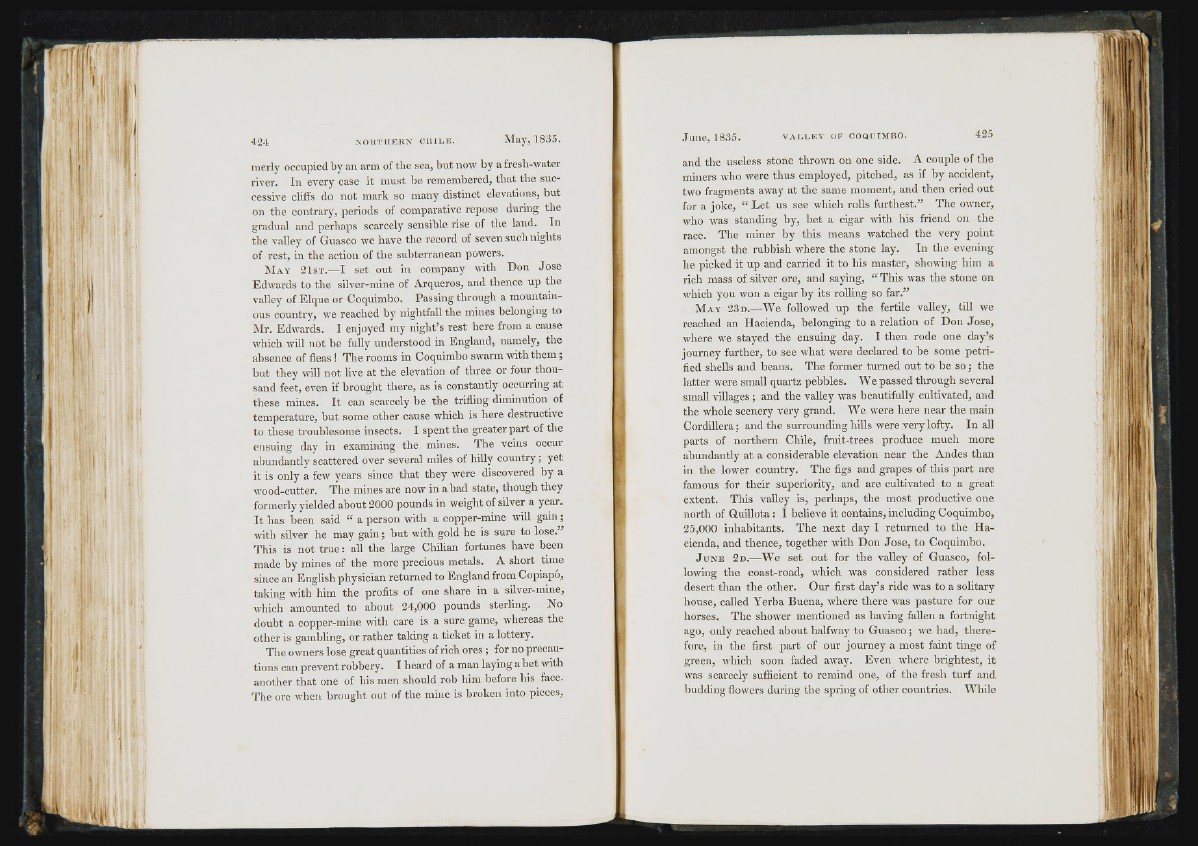
V , | iT
ft ?
ftil
I 1. ft
M ft i
1 , ft-
L;:
t;
meiiy occupied by an arm of the sea, but now by a fresh-water
river. In every case it must be remembered, that the successive
cliffs do not mark so many distinct elevations, but
on the contrary, periods of comparative repose during the
gradual and perhaps scarcely sensible rise of the land. In
the valley of Guasco we have the record of seven such nights
of rest, in the action of the subterranean powers.
A I a y 2 1 s t .—I set out in company with Don Jose
Edwards to the silver-mine of Arqueros, and thence up the
valley of Elque or Coquimbo. Passing through a mountainous
country, we reached by nightfall the mines belonging to
Mr. Edwards. I enjoyed my night’s rest here from a cause
which will not be fully understood in England, namely, the
absence of fleas ! The rooms in Coquimbo swarm with them;
but they will not live at the elevation of three or four thousand
feet, even if brought there, as is constantly occurring at
these mines. It can scarcely be the trifling diminution of
temperature, but some other cause which is here destructive
to these troublesome insects. I spent the greater part of the
ensuing day in examining the mines. The veins occur
abundantly scattered over several miles of hilly country; yet
it is only a few years since that they were discovered by a
wood-cutter. The mines are now in a bad state, though they
formerly yielded about 2 0 0 0 pounds in weight of silver a year.
It has been said “ a person with a copper-mine will gain;
with silver he may gain; but with gold he is sure to lose.
This is not true: all the large Chilian fortunes have been
made by mines of the more precious metals. A short time
since an English physician returned to England from Copiapo,
taking with him the profits of one share in a silver-mine,
which amounted to about 24,000 pounds sterling. No
doubt a copper-mine with care is a sure game, whereas the
other is gambling, or rather taking a ticket in a lottery.
The owners lose great quantities of rich ores; for no precautions
can prevent robbery. I heard of a man laying a bet with
another that one of his men should rob him before his face.
The ore when brought out of the mine is broken into pieces.
and the useless stone thrown on one side. A couple of the
miners who were thus employed, pitched, as if by accident,
two fragments away at the same moment, and then cried out
for a joke, “ L et us see which rolls furthest.” The owner,
who was standing by, bet a cigar with his friend on the
race. The miner by this means watched the very point
amongst the rubbish where the stone lay. In the evening
he picked it up and carried it to his master, showing him a
rich mass of silver ore, and saying, “ This was the stone on
which you won a cigar by its rolling so far.”
M a y 2 3 d .—We followed up the fertile valley, till we
reached an Hacienda, belonging to a relation of Don Jose,
where we stayed the ensuing day. I then rode one day’s
journey further, to see what were declared to be some petrified
shells and beans. The former turned out to be s o ; the
latter were small quartz pebbles. We passed through several
smaU villages ; and the valley was beautifully cultivated, and
the whole scenery very grand. We were here near the main
Cordillera; and the surrounding hills were very lofty. In all
parts of northern Chile, fruit-trees produce much more
abundantly at a considerable elevation near the Andes than
in the lower country. The figs and grapes of this part are
famous for their superiority, and are cultivated to a great
extent. This valley is, perhaps, the most productive one
north of Quillota : 1 believe it contains, including Coquimbo,
25,000 inhabitants. The next day I returned to the Hacienda,
and thence, together with Don Jose, to Coquimbo.
J u n e 2 d .—We set out for the valley of Guasco, following
the coast-road, which was considered rather less
desert than the other. Our first day’s ride was to a solitary
house, called Yerba Buena, where there was pasture for our
horses. The shower mentioned as having fallen a fortnight
ago, only reached about halfway to Guasco; we had, therefore,
in the first part of our journey a most faint tinge of
green, which soon faded away. Even where brightest, it
was scarcely sufficient to remind one, of the fresh turf and
budding flowers during the spring of other countries. While